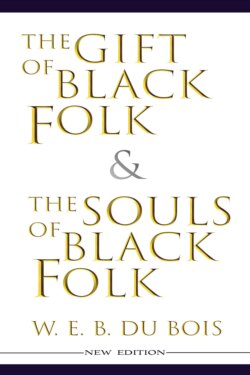Читать книгу The Gift of Black Folk & The Souls of Black Folk (New Edition) - W. E. B. Du Bois - Страница 18
На сайте Литреса книга снята с продажи.
1. Democracy
ОглавлениеDemocracy was not planted full grown in America. It was a slow growth beginning in Europe and developing further and more quickly in America. It did not envisage at first, the man farthest down as a participant in democratic privilege or even as a possible participant. This was not simply because of the inability of the ignorant and degraded to express themselves and act intelligently and efficiently, but it was a failure to recognize that the mass of men had any rights which the better class were bound to respect. Thus democracy to the world first meant simply the transfer of privilege and opportunity from waning to waxing power, from the well-born to the rich, from the nobility to the merchants. Divine Right of birth yielded the Divine Right of wealth. Growing industry, business and commerce were putting economic and social power into the hands of what we call the middle class. Political opportunity to correspond with this power was the demand of the eighteenth century, and this was what the eighteenth century called Democracy. On the other hand, both in Europe and in America, there were classes, and large classes, without power and without consideration whose place in democracy was inconceivable both to Europeans and Americans. Among these were the agricultural serfs and industrial laborers of Europe and the indentured servants and black slaves of America. The white serfs, as they were transplanted in America, began a slow, but in the end, effective agitation for recognition in American democracy. And through them has risen the modern American labor movement. But this movement almost, from the first, looked for its triumph along the ancient paths of aristocracy and sought to raise the white servant and laborer on the backs of the black servant and slave. If now the black man had been inert, unintelligent, submissive, democracy would have continued to mean in America what it means so widely still in Europe, the admission of the powerful to participation in government and privilege in so far and only in so far as their power becomes irresistible. It would not have meant a recognition of human beings as such and the giving of economic and social power to the powerless.
It is usually assumed in reading American history that whatever the Negro has done for America has been passive and unintelligent, that he accompanied the explorers as a beast of burden and accomplished whatever he did by sheer accident; that he labored because he was driven to labor and fought because he was made to fight. This is not true. On the contrary, it was the rise and growth among the slaves of a determination to be free and an active part of American democracy that forced American democracy continually to look into the depths; that held the faces of American thought to the inescapable fact that as long as there was a slave in America, America could not be a free republic; and more than that: as long as there were people in America, slave or nominally free, who could not participate in government and industry and society as free, intelligent human beings, our democracy had failed of its greatest mission.
This great vision of the black man was, of course, at first the vision of the few, as visions always are, but it was always there; it grew continuously and it developed quickly from wish to active determination. One cannot think then of democracy in America or in the modern world without reference to the American Negro. The democracy established in America in the eighteenth century was not, and was not designed to be, a democracy of the masses of men and it was thus singularly easy for people to fail to see the incongruity of democracy and slavery. It was the Negro himself who forced the consideration of this incongruity, who made emancipation inevitable and made the modern world at least consider, if not wholly accept, the idea of a democracy including men of all races and colors.
